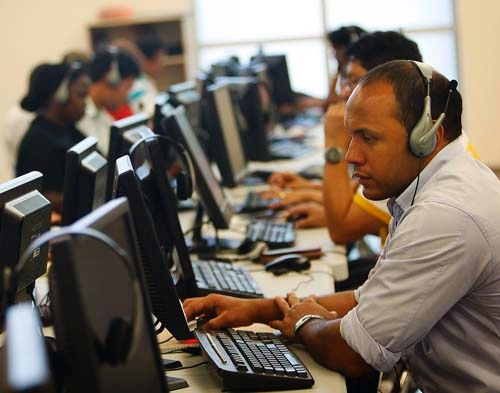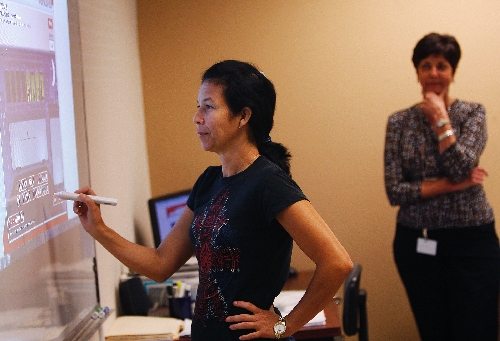New life in U.S. starts with language for refugees
Joanne Lindsay has a simple command for some of her students in this afternoon's class.
"If you are a man, raise your hand."
Half the male students comply. The others puzzle over her words, brows furrowed in concentration.
Several female classmates click their tongues and smile. But it's a friendly, supportive kind of teasing among adults who have faced challenges a lot more daunting than those presented in a beginning English class.
These students are refugees, people who have fled their former countries because of racial, religious or political persecution.
They're here, at Catholic Charities of Southern Nevada's campus on Las Vegas Boulevard North at Owens Avenue, to study English as part of the agency's migration and refugee program. Some have been in the United States only a few weeks.
The free classes, offered at a variety of times and levels, also are open to the general public. In the evening, they draw more students from the larger community looking to improve their English skills.
The daytime students are mainly refugees from Somalia, Afghanistan, Cuba, Iraq - any country in which they can prove a well-founded fear of persecution.
All the students in this afternoon's class are Cuban refugees, ranging in age from late teens to the mid-50s. They each recently were granted asylum after fleeing the communist island nation.
"There is no freedom, no opportunity to do anything there," Jesus, 52, said in Spanish. He doesn't want to give his last name, afraid speaking out could bring trouble to his family back in Cuba.
Jesus arrived in the United States four months ago after a long journey.
He fled Cuba a year and a half ago when he got permission to travel to Ecuador as part of his job at the government ministry, something he had been working on for years.
It then took him more than a year to travel by foot and bus from Ecuador to Brownsville, Texas.
He left behind a wife and son and arrived penniless. All of this is preferable to life in Cuba, he said.
"I have a goal and I want to work, probably in a casino," he said.
He has no idea when - or if - he'll see his family again.
"That's a good question. It all depends on luck," he said.
Jesus has brought along his application for a driver's license, and asks teacher Robert Fink for help filling it out. While Jesus' English is limited, he proudly demonstrates some of what he has learned: "One-way. Stop."
He's already got a leg up on a few of the refugees in other classes. Some came with no education whatsoever, and after years spent in foreign refugee camps. They can't read or write.
"Some have never picked up a pencil in their lives," Fink said. "They don't understand what a letter represents."
Those students begin by learning the alphabet, using pictures and computer games to help.
Plenty of mistakes are expected in the lower-level classes, and the simplest successes - a sentence read aloud, a question understood - are rewarded with a hearty round of applause.
"We try to treat everybody with respect," said Juanita Russell-Latham, manager of the English language program.
The students are highly motivated, mainly because they desperately want to find work.
"They realize they are not going to get a job without English," Russell-Latham said.
The refugees come from all walks of life. Some were doctors or other professionals in their homelands. One was an airline pilot. His new goal is to get any kind of work at the airport, even if it's handling baggage.
Sajiri, who also declined to give her last name, worked for a communications company in Cuba. The 37-year-old said she doesn't much care what kind of work she does in the United States. She's just happy to be here.
"I'm looking for a better future," she said in Spanish. "In Cuba it's all poverty and misery."
Thousands of refugees call the Las Vegas Valley home. The resettlement process is complicated and can be lengthy.
If approved by federal immigration officials, refugees are assigned to a sponsor such as Catholic Charities. The agency has provided resettlement services since 1975 and helps about 1,000 refugees annually. It provides furnished apartments, short-term financial and medical assistance through a federal grant, and job placement. Refugees may apply for legal permanent resident status after a year in the United States.
Six English teachers work with some 800 students each year at Catholic Charities. The state's department of education funds the program. Students take periodic proficiency tests to monitor their progress. Volunteers provide tutoring.
The agency tries to be sensitive about cultural differences. A place is set aside for Muslims to pray.
Back in the classroom, the Cubans learn how to ask for directions in English. Then they play "Guess the word," a version of Hangman projected onto a screen. They help each other in Spanish and English.
One of the men is first to correctly guess a nine-letter word: "drugstore."
The other students cheer. Then they give him a round of applause.
Contact Lynnette Curtis at Lynnette.Curtis@yahoo.com.


















